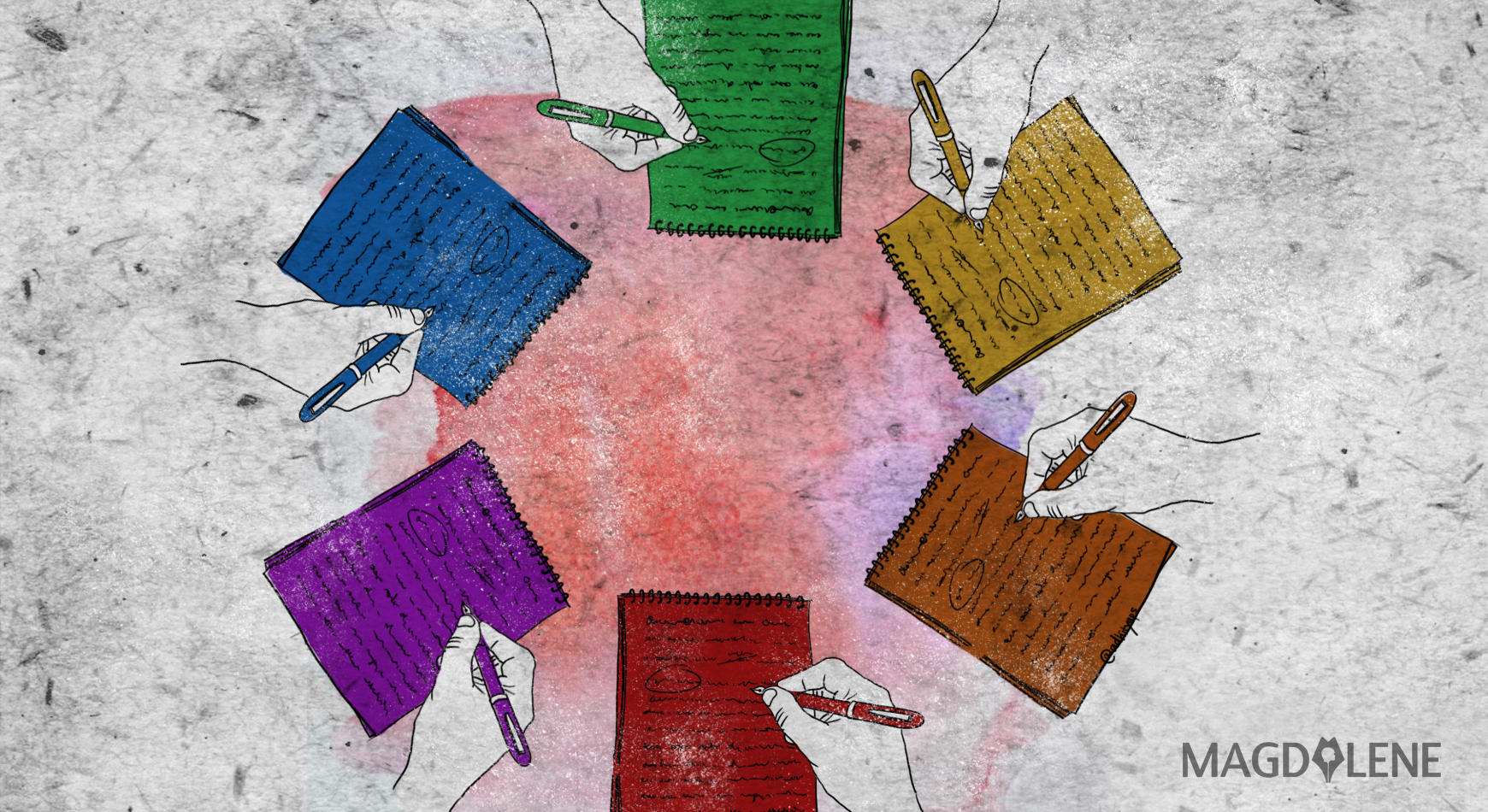“From my experience […] I know much about prison life. If I were a writer like you, maybe I am able to compose a story of prison-life […] the sorrows and pleasures of a prisoner.” – Indonesian political prisoner Pudji Aswati in a letter dated 25 April 1983.
The personal letter was sent to British writer Patricia Cleveland-Peck, who began to write letters to political detainees around the world as part of an organized campaign by the Religious Society of Friends (Quakers). The Quakers, a Christian religious denomination founded in Britain in the 17th century, are highly engaged in advocacy for political prisoners.
Sending postcards and letters to political detainees and government authorities has been an integral part of human rights campaigns, mainly in Western countries, run by organizations such as Amnesty International. Members are asked to write to foreign authorities to plead on behalf of political detainees to ensure their safety and secure their release.
Pudji and her husband, Gatot Lestario, were victims of human rights abuses in Indonesia in the mid-1960s. Almost half a million were killed and many were jailed, mostly without trial, for their links with the Indonesian Communist Party.
By receiving letters, detainees felt connected. For the Indonesian prisoners, corresponding with foreign pen pals stood in contrast with the stigmatization suffered in their own country.
Campaign from personal letters
Personal letters are intimate forms of communication. When analyzed sensitively and ethically, they provide an important window for historians to see the powerful emotional connections built between letter writers.
I analyzed the letters between Pudji and Cleveland-Peck and they show that the relationship between the altruistic campaigner and political detainee developed beyond the “form letter” into something deeper.
The women wrote of their families, dreams, hobbies and daily activities.
Also read: Women Some of the Worst Victims in 1965 Atrocities
In July 1985, the authorities carried out Gatot’s death sentence. When this news reached Cleveland-Peck via the campaign networks, she penned a letter to express her deep condolences, to which Pudji responded:
Your letter is a great meaning for me because you regard us as human beings with feelings and thoughts. You could imagine how great my loss was; it seems now that I stand alone to face this challenge. There are no consolations anymore which encourage me not to lose my hope. I have lost not only a husband, but also a teacher. But I must be courageous, how hard and bitter it must be.
Cleveland-Peck provided me with her collection of personal letters. Among them are over 100 letters between the two women, as well as others exchanged between pen pals and supporters.

Pudji’s letters and Cleveland-Peck’s fundraising articles. (Vannessa Hearman)
Cleveland-Peck was drawn to Pudji’s sharp intellect and the two women corresponded for a decade.
Pudji was indeed a remarkable woman, yet she was imprisoned in 1968 due to her affiliation with the leftist women’s organization Gerwani (Indonesian Women’s Movement). The army banned Gerwani for supporting an alleged coup in cooperation with the Indonesian Communist Party in 1965. The army captured Pudji and her husband Gatot, an organizer for the party, in south of Blitar, East Java. Gatot was sentenced to death while Pudji was sent to prison for 15 years.
Cleveland-Peck campaigned for the release of Indonesian political prisoners with other pen pals and with the Quakers, Amnesty International and the TAPOL human rights campaign. In honor of her friendship with Pudji, Cleveland-Peck also founded the Pudji Fund (later renamed the Rehabilitation Fund for Prisoners of Conscience (RFPC).
Growing movement
Established in 1986, the Pudji Fund helped provide financial support to Pudji and other former detainees.
“My criterion for distribution was simple,” Cleveland-Peck told me.
“The fund was intended to help non-violent political prisoners restart their lives on release. And if the money was there, I refused no reasonable request.”
Also read: Exploring Indonesia’s Dark History in “Susi Susanti – Love All”
In 1989, the Quakers gave Cleveland-Peck a travel bursary. The two women finally met in a home Pudji shared with other former inmates on the outskirts of Malang, East Java. By that time, Pudji was already ill with the cancer that had first struck her in prison.
It was to be their first and last meeting. In 1992, Cleveland-Peck received a letter from one of the women about Pudji’s passing.

Patricia Cleveland-Peck (right) with Pudji Aswati (second from right) finally meets at
the latter’s house in Malang, East Java, in 1989. (Dennis Cleveland-Peck)
The fund bearing her name thrived, supporting former political prisoners in Indonesia, Chile, Mexico, South Africa and the Philippines. The fund was sustained by regular donations, including from Gatot and Pudji’s former pen pals, many as a result of Cleveland-Peck’s articles in a Quaker newsletter.
In 2018, the RFPC, as it was called then, was finally wound down. It was not as established and well-funded as other similar charities such as Prisoners of Conscience. But Cleveland-Peck’s efforts ensured the Indonesian prisoners were remembered long after they were gone.
“Puji was an important person in my life. The fund was completely motivated by Pudji and my initial correspondence. It was good to explain to other recipients that I was doing it in her memory. The Indonesian prisoners and what they had been through was crucial to it,” she recalled.
Indonesia tries to ignore the human rights abuses of 1965-66 and its stigmatization of former political prisoners. Friendships like Cleveland-Peck’s with Pudji Aswati challenged such inhumanity.
The women’s letters, and other similar correspondences held in archives around the world, can help a nation understand more about the people who were marginalized and silenced by the state.
This article was first published on The Conversation, a global media resource that provides cutting edge ideas and people who know what they are talking about.




-thumb.jpg)


Comments